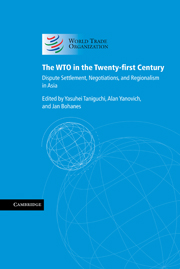Book contents
- Frontmatter
- Contents
- Notes on contributors
- Acknowledgements
- Table of dispute settlement cases and reports
- List of abbreviations
- Introduction
- PART I The WTO at Ten
- PART II Accomplishments and Future Prospects of the WTO Dispute Settlement System
- PART III Asian Perspectives on WTO Dispute Settlement
- PART IV The Doha Development Agenda and Beyond
- 16 The central place of market access for the WTO's development round
- 17 Agricultural issues in the Doha Development Agenda negotiations
- 18 Beyond Doha: reflections on the future of trade remedies
- 19 Reflections on the relationship between WTO negotiations and dispute settlement: lessons from the GATS
- 20 Trade in services and sustainable development in the context of the WTO: the case of higher education
- 21 The WTO and sustainable development
- PART V Asian Regional Integration and the Multilateral Trading System
- Index
18 - Beyond Doha: reflections on the future of trade remedies
from PART IV - The Doha Development Agenda and Beyond
Published online by Cambridge University Press: 05 March 2012
- Frontmatter
- Contents
- Notes on contributors
- Acknowledgements
- Table of dispute settlement cases and reports
- List of abbreviations
- Introduction
- PART I The WTO at Ten
- PART II Accomplishments and Future Prospects of the WTO Dispute Settlement System
- PART III Asian Perspectives on WTO Dispute Settlement
- PART IV The Doha Development Agenda and Beyond
- 16 The central place of market access for the WTO's development round
- 17 Agricultural issues in the Doha Development Agenda negotiations
- 18 Beyond Doha: reflections on the future of trade remedies
- 19 Reflections on the relationship between WTO negotiations and dispute settlement: lessons from the GATS
- 20 Trade in services and sustainable development in the context of the WTO: the case of higher education
- 21 The WTO and sustainable development
- PART V Asian Regional Integration and the Multilateral Trading System
- Index
Summary
We just commemorated the 100th anniversary of the first national antidumping law. For much of that history, anti-dumping laws and other trade remedies remained obscure and relative unimportant features of trade policy. That situation began to change in the 1980s. Over the past 25 years, however, trade remedies have grown in importance. As other forms of trade restrictions have been reduced or eliminated, trade remedies have taken their place.
As we now commemorate the 10th anniversary of the World Trade Organization (WTO), it is appropriate to review the experience of the past two decades and reflect on what might happen over the next two decades. In doing so, it is useful to consider the history of trade remedies before and after creation of the WTO in 1995. With that history as background, we can then discuss what trends seem likely in the future. We can also draw on the growing body of scholarly literature that has studied trade remedies, and tried to explain their trends and effects.
To borrow a phrase from the Princeton economist Jacob Viner, trade remedies have been a growing ‘problem in international trade’. We must now ask whether the problem will continue to grow beyond Doha. I fear the problem will continue to grow, as trade restrictions will continue to migrate from areas of tighter discipline to those areas – principally trade remedies – with weaker disciplines. This chapter offers some thoughts on this important question.
- Type
- Chapter
- Information
- The WTO in the Twenty-first CenturyDispute Settlement, Negotiations, and Regionalism in Asia, pp. 341 - 366Publisher: Cambridge University PressPrint publication year: 2007
- 1
- Cited by



